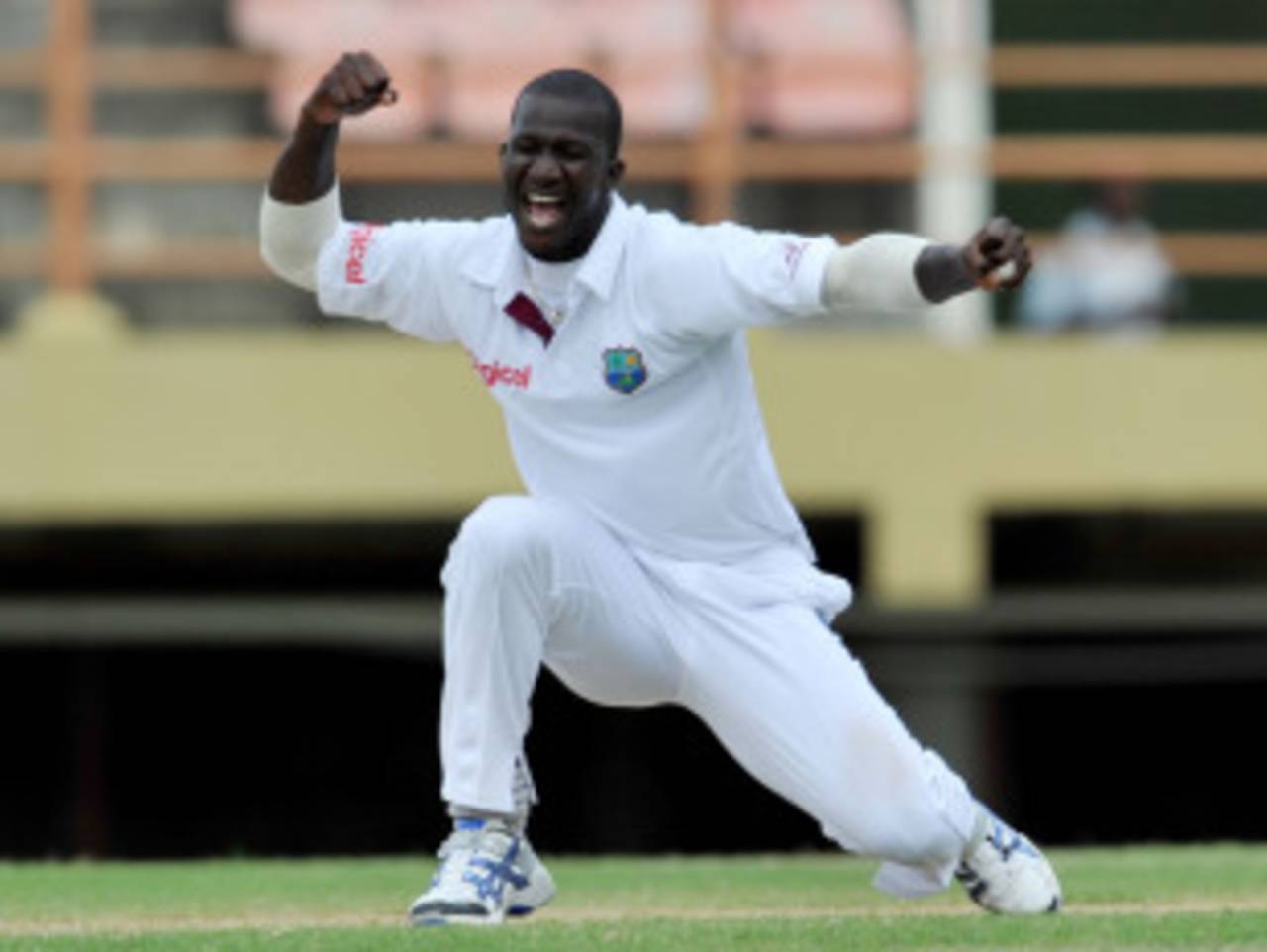A win is a win
The success against Pakistan is not necessarily an indication of brighter times ahead for West Indies cricket, but it needs to be savoured
Fazeer Mohammed
16-May-2011

Not given due credit? • AFP
Don't look so sour. Despite yesterday's aberration, West Indies cricket is not back on track, and so many of you will be utterly relieved to hear that.
It is a measure of the enthusiasm-sapping impact of the staggering decline from the dizzying heights of 16 years ago, coupled with the unending series of controversies swirling around the regional game, that many people follow the Caribbean side these days merely to get more reasons to criticise and condemn.
In fact, the plummet from the summit has contributed to an intensifying of parochialism, tribalism, insularity and race-based loyalties to the extent that when, on one of those infrequent occasions when the team performs well and actually goes on to win, a new level of creativity comes to the fore as roundabout journeys are devised to navigate around the small matter of victory and still arrive at a destination comfortable enough to take a lag in the players' miserable tails.
Did you see the looks on some of the faces of those at Providence Stadium after Darren Sammy sealed the 40-run victory with his fifth wicket of the innings? If they weren't supporting Pakistan outright, more than a few appeared distinctly indifferent to a West Indian success that seemed completely out of the question after the first day of this first Test ended with the home side at 209 for nine. That they fought back and won on the fourth afternoon in defence of a target of 219 has briefly taken the air out of the tyres of those rolling along merrily with their respective agendas while West Indies slid from one humiliation to another, especially since the last Test win more than two years ago against England at Sabina Park.
Take the Trini breakaway posse for example. The members of this tribe support their fellow nationals to the hilt, but hope West Indies never abandon that losing feeling as it supposedly strengthens their case for the twin-island state to go it alone. Go where is not exactly clear, for the rules of the International Cricket Council suggest that it is long, complex and impractical for any territory to abandon the long-established principle of the West Indies as a unified cricket entity.
Then there are those who are not interested in any form of secession, but just put their own ahead of the broader interests of the team. So if West Indies lose, they lose. If, miracle of miracles, they win, they win. No big deal one way or the other, so long as Lendl Simmons and Darren Bravo are scoring runs and Ravi Rampaul is taking wickets.
More than any other sentiment, though, the most widespread concern will be that this hard-fought victory in Guyana will be a vindication of the modus operandi of the WICB
Just so that matters of loyalty can be complicated further, there's the segment of the population that values ethnicity above all else, even nationhood, so that the size of the Indian presence in relation to the African presence in the composition of the final 11 is of paramount importance. Poor Brendan Nash, who would obviously be classified as "other", just gets in the way.
And how could we ignore the issue of the captaincy, especially as it was presented on a platter to Sammy, and for an unprecedented extended first term to boot by his fellow St Lucians at the very helm of the West Indies Cricket Board? There is no question that his position at the helm creates an imbalance in the squad, both in terms of the depth in batting (Test average 16.10) and effectiveness in bowling. Still, there seems a general unwillingness to even acknowledge when he performs creditably.
If West Indies had lost that opening Test, it would have been Sammy's fault because of his mediocre all-round numbers (by the way, 36 wickets in 12 Tests at 26.25 with four five-wicket innings hauls is quite decent) and limited tactical acumen. Now that they've won means the credit is automatically shifted to the support staff, the individual contributions of other players and, of course, the spinelessness of the Pakistani batting. And what of the captain's figures of five for 29 off 17 overs (seven in the match and the Man of the Match award by the way)? Oh well, that's only because the man from Micoud is an up-and-down seamer flattered by an up-and-down pitch against players ill-equipped technically and temperamentally for such a challenge. Sammy must feel like building contractors contemplating taking the government to court over long-overdue money: when you lose, you lose and when you win, you lose.
More than any other sentiment, though, the most widespread concern will be that this hard-fought victory in Guyana will be a vindication of the modus operandi of the WICB. In this PR-driven multimedia era, expect mellifluous prose in praise of the boys from the much-maligned governing body, counterbalanced by a grudging acknowledgement of the effort by the West Indies Players Association that will not be able to resist one or two digs at the administration along the way.
Yet in the midst of all these complex and disparate interest groups, there will be a few simple souls who are just happy that they can savour a victory by their West Indies team. They know it represents no light at the end of the tunnel, no start of a turnaround, no new dawn, notwithstanding the tripe being uttered by those who should know better. For them, a win is a win, and in this protracted guava season, it will more than suffice, even if so many others around them are vex like hell.
Fazeer Mohammed is a writer and broadcaster in Port-of-Spain, Trinidad